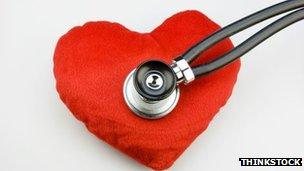'Heart shrinking' trial to combat heart failure to begin
- Published

Nearly one million people in the UK have heart failure.
A trial using electricity to shrink the hearts of patients with heart failure is about to start in Liverpool.
It will involve electrically stimulating one of the nerves leading to the heart, which it is hoped could shrink the heart and improve life expectancy.
The technique is being trialled in humans after <link> <caption>it was shown to keep rats and dogs alive for longer</caption> <url href="http://circ.ahajournals.org/content/109/1/120" platform="highweb"/> </link> .
This first patient at Liverpool will be operated on in the next few days.
The heart pumps blood around the body, and when it fails to do this properly people can become tired and out of breath far more quickly. For some patients it feels like running a marathon when they are only sitting in an armchair.
Heart failure affects around 900,000 people in the UK and can be the result of high blood pressure, dead heart muscle after a heart attack, or a genetic condition.
Bigger and bigger
As the heart loses its ability to pump, it fills with too much blood and becomes stretched over time. The more the heart enlarges, the worse the symptoms.
Surgeons at Liverpool Heart and Chest Hospital and The Royal Liverpool University Hospital hope to reverse the damage.
They will fit a device - similar to a pacemaker - to the vagus nerve which runs to the heart. Surgeons said the electrical stimulation should "protect the heart" from the effects of the hormone adrenaline.
Adrenaline makes the heart pump harder and faster; this is one of the body's responses to heart failure - but doctors say it becomes toxic over time and damages the heart further.
The idea is that by shielding the heart, it will stop enlarging and begin to shrink.
Dr Jay Wright, a consultant cardiologist at Liverpool Heart and Chest Hospital, told the BBC: "We're hoping it will shrink the heart, but it might not be to normal size."
He said shrinkage "would lead to improvement in symptoms - we know that the bigger the heart the worse the symptoms".
Nearly 100 patients will take part in the trial at 30 hospitals around the world.
Carl Jordan, who used to be a paramedic, will be operated on this week. He has had several heart attacks which have damaged his heart, causing it to become enlarged.
He said: "Being the first person to have this device implanted in Liverpool was a huge decision.
"My quality of life at the moment is not great, because of the restrictions my condition has imposed on me, especially the breathing problem, as some days this is quite severe and getting worse.
"Another factor is I have a young family who, although I am the one with the illness, they too are living with it and see every day what it can do to me, so hopefully it will improve my quality of life as well as the lives of others."
The Bristol Heart Institute is hoping to impant the device into five to 10 patients over the next year.
Dr Angus Nightingale, a consultant cardiologist at Bristol, said: "Stimulating the vagus nerve is commonly used to treat epilepsy and depression, but may have other significant benefits.
"The stimulation should alter the balance of the system and improve cardiac function."
- Published10 April 2012